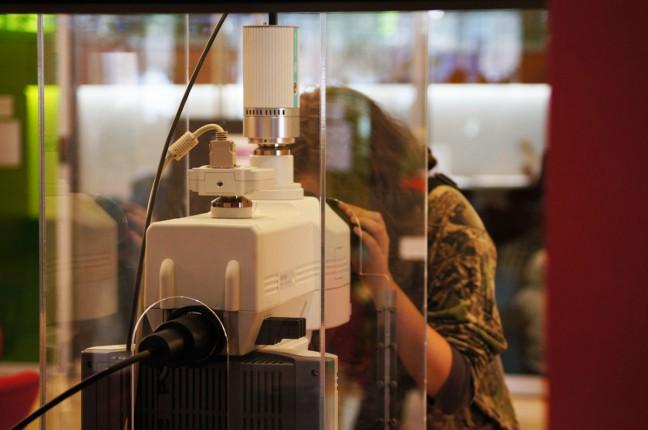After a paper found that biomedical research is “an unsustainable, hyper competitive system,” the University of Wisconsin began a campus-wide conversation Monday launched by Chancellor Rebecca Blank.
The goal of the Monday afternoon forum was to start discussion on campus and to show UW faculty data that benchmarks the contributing factors of the biomedical challenge, said Marsha Mailick, interim vice chancellor for research and graduate education.
The realization that the biomedical research system is “unsustainable” came in April 2014 when the Proceedings of the National Academy of Sciences released a paper that described the problem the biomedical community is facing, Judith Kimble, Howard Hughes Medical Institute investigator, said.
The paper that originally identified biomedical research as “an unsustainable, hyper competitive system” discouraged students and scientists from doing their best work and made concrete recommendations to remedy the situation.
“I think a lot of people didn’t like those recommendations,” Kimble said. “It laid out some very important issues.”
The forum would look at long-term trends in terms of federal funding and the structure of research at universities, Blank said.
Blank said the biomedical research system has been operating under the assumption that their resources will continue to grow but as times change the expansion of resources cannot be assumed.
“The reputation of this university depends on the reputation of its faculty and staff,” Blank said. “We have to keep and retain them here. They attract the best and brightest of new faculty that come and attract top notch undergraduates.”
Blank said she hopes the changes made during the discussion will influence the biomedical system as a whole and the dialogue will influence the campus.
One aspect of the biomedical crisis is an imbalance between the number of investigators applying for research grants and the funding allocated by the National Institute of Health, Kimble said.
“The research environment is threatened to be less productive in the long run,” Kimble said. “The number of applications is going up and the success rate is going down.”
This imbalance has lead to increased funding pressures, Kimble said. She said investigators spend more time writing grants that have become increasingly conservative. She said it has also led to shortcuts in research where there are growing concerns about reproducibility, putting stress on the peer review system.
“NIH needs more money,” Kimble said. “We need to continue to advocate for more money for NIH. This will affect the nation and it’s worth fighting for more money.”
UW will have its first cross campus discussion April 11 and become part of the national effort to find solutions. At the UW workshop, faculty will make concrete recommendations to change policy.
UW needs to start putting policies in place that will act in the short time as well as have long-term goals, Kimble said.
“[The goals] are ambitious,” Kimble said. “We’re here to find answers and solutions, and make recommendations for people to talk about. We want to put out the next group of recommendations that will be discussed and some of them, hopefully, implemented.”
The design of this workshop is an active design, Mailick said.
There will be pre-workshop discussions throughout March, where faculty can make recommendations that will “trickle into the workshop,” Kimble said.


